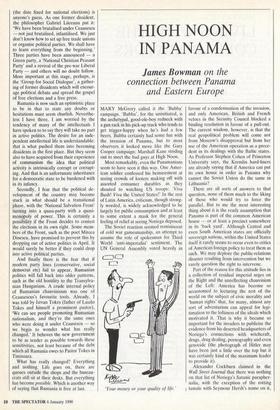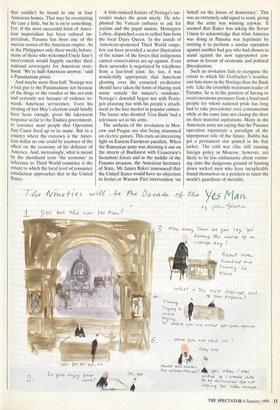HIGH NOON IN PANAMA
James Bowman on the
connection between Panama and Eastern Europe
MARY McGrory called it the 'Bubba' campaign. 'Bubba', for the uninitiated, is the archetypal, good-ole-boy redneck with a gun rack in his pick-up truck who tends to get trigger-happy when he's had a few beers. Bubba certainly had some fun with the invasion of Panama, but to most observers it looked more like the Gary Cooper campaign: Marshall Kane striding out to meet the bad guys at High Noon.
Most remarkably, even the Panamanians seem to have seen it this way. One Amer- ican soldier confessed his bemusement at seeing crowds of looters making off with assorted consumer durables as they shouted to watching US troops: 'Viva Bush! Viva the United States!' In the rest of Latin America, criticism, though strong- ly worded, is widely acknowledged to be largely for public consumption and at least to some extent a mask for the general feeling of relief at seeing Noriega deposed.
The Soviet reaction seemed reminiscent of cold war gamesmanship, an attempt to assume the role of spokesman for Third World `anti-imperialist' sentiment. The UN General Assembly voted heavily in 'Your money or your quality of life.' favour of a condemnation of the invasion, and only American, British and French vetoes in the Security Council blocked a binding resolution in favour of a pull-out. The current wisdom, however, is that the real geopolitical problem will come not from Moscow's disapproval but from her use of the American operation as a prece- dent in its dealings with the Baltic states. As Professor Stephen Cohen of Princeton University says, the Kremlin hard-liners are already saying that if America can put its own house in order in Panama why cannot the Soviet Union do the same in Lithuania?
There are all sorts of answers to that question, none of them much to the liking of those who would try to force the parallel. But to me the most interesting thing about it is the ready assumption that Panama is part of the common American house — or at least a precinct somewhere in its 'back yard'. Although Central and even South American states are officially sovereign nations, within the United States itself it rarely seems to occur even to critics of American foreign policy to treat them as such. We may deplore the public-relations disaster resulting from intervention but we rarely question the right to intervene.
Part of the reason for this attitude lies in a collection of residual imperial urges on the Right and the unreflecting chauvinism of the Left: America has become so accustomed to lecturing the rest of the world on the subject of civic morality and `human rights' that, for many, almost any sort of adventurism can appeal for legi- timation to the loftiness of the ideals which motivated it. That is why it became so important for the invaders to publicise the evidence from his deserted headquarters of Noriega's connections with witchcraft, drugs, drug dealing, pornography and even genocide (the photograph of Hitler may have been just a little over the top but it was certainly kind of the maximum leader to provide it).
Alexander Cockburn claimed in the Wall Street Journal that there was nothing on that list of Noriega's Satanic parapher- nalia, with the exception of the rotting tamale with Seymour Hersh's name on it,
that couldn't be found in one in four American homes. That may be overstating the case a little, but he is on to something. For, if the most successful form of Amer- ican imperialism has been cultural im- perialism, Panama has been one of the success stories of the American empire. As in the Philippines only three weeks before, many of those who welcomed Uncle Sam's intervention would happily sacrifice their national sovereignty for American state- hood. 'We're half-American anyway,' said a Panamanian priest.
And maybe more than half. Noriega was a bad guy to the Panamanians not because of the drugs or the voodoo or the sex-aids and certainly not because of violence to- wards American servicemen. Even his stealing of last May's election could hardly have been enough, given the lukewarm response so far to the Endara government, to convince most people that Operation Just Cause lived up to its name. But in a country where the currency is the Amer- ican dollar no one could be unaware of the effect on the economy of his defiance of America. And, increasingly, what is meant by the shorthand term 'the economy' in reference to Third World countries is the extent to which the local level of consumer satisfaction approaches that in the United States.
A little-noticed feature of Noriega's sur- render makes the point nicely. He tele- phoned the Vatican embassy to ask for asylum and the papal nuncio, Monsignor Laboa, dispatched a car to collect him from the local Dairy Queen. In the annals of American-sponsored Third World coups, few can have provided a neater illustration of the nature of the forces that indigenous cutural conservatives are up against. Even their surrender is negotiated by telephone from a fast-food joint. So, too, it was wonderfully appropriate that American gloating over the cornered ex-dictator should have taken the form of blaring rock music outside the nuncio's residence. Noriega's downfall began not with Penta- gon planning but with his people's attach- ment to the free market in popular culture. The looter who shouted 'Viva Bush' had a television set in his arms.
The anthems of the revolution in Mos- cow and Prague are also being strummed on electric guitars. This casts an interesting light on Eastern European parallels. When the Rumanian army was shooting it out on the streets of Bucharest with Ceaucescu's Securitate forces and in the middle of the Panama invasion, the American Secretary of State, Mr James Baker announced that the United States would have no objection to Soviet or Warsaw Pact intervention 'on behalf on the forces of democracy'. This was an extremely odd signal to send, giving that the army was winning anyway. It seemed that Baker was asking the Soviet Union to acknowledge that what America was doing in Panama was legitimate by inviting it to perform a similar operation against another bad guy who had chosen to stand against the new superpower con- sensus in favour of economic and political liberalisation.
Such an invitation fails to recognise the extent to which Mr Gorbachev's troubles cast him more in the Noriega than the Bush role. Like the erstwhile maximum leader of Panama, he is in the position of having to resist enormous pressures from a frustrated people for whom national pride has long had to take precedence over consumerism while at the same time not closing the door on their material aspirations. Many in the American army are saying that the Panama operation represents a paradigm of the superpower role of the future. Bubba has got a permanent star pinned to his flak jacket. The cold war elite still running foreign policy in Moscow, however, are likely to be less enthusiastic about ventur- ing onto the dangerous ground of hunting down wicked men who have inexplicably found themselves in a position to taunt the world's guardians of morality.











































 Previous page
Previous page